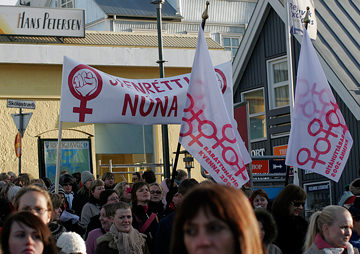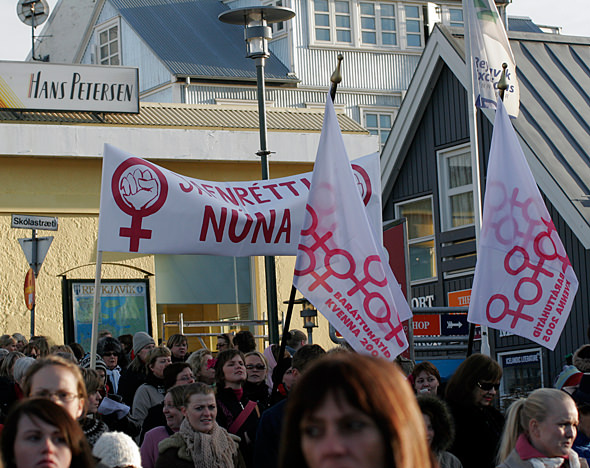Once Upon a Time, Nearly All of Iceland’s Women Went on Strike, and the Results Were Incredible
In October 1975, 90 percent of Iceland's women refused to work for one whole day. The anniversary of that event, called "Women's Day Off," is celebrated on Oct. 24 each year and has led to undeniable progress on the women's rights front. Perhaps American women can take a page out of their Icelandic peers' book.

Even Iceland, called the most feminist country in the world, hasn’t been able to end the gender pay gap, and women there — as shown in the scene above — continue to voice their demands. (Petur Asgeirsson / Shutterstock)
In October 1975, Icelandic women joined together in a national protest of gender inequality. For one day, 90 percent of Iceland’s women refused to work in their offices or homes. The anniversary of that event, called “Women’s Day Off,” is celebrated on Oct. 24 each year and has led to undeniable progress on the women’s rights front. For the last 40 years, Iceland — which has been hailed as the “most feminist place in the world” — has been reminded annually of the importance of equal pay in the workplace as well as fair compensation for housework and child care.
The BBC reports on the historic event after which men “began to get the point”:
Forty years ago, the women of Iceland went on strike – they refused to work, cook and look after children for a day. It was a moment that changed the way women were seen in the country and helped put Iceland at the forefront of the fight for equality…It is known in Iceland as the Women’s Day Off, and [Vigdis Finnbogadottir, Europe’s first female president] sees it as a watershed moment.
“What happened that day was the first step for women’s emancipation in Iceland,” she says. “It completely paralysed the country and opened the eyes of many men.”
Banks, factories and some shops had to close, as did schools and nurseries – leaving many fathers with no choice but to take their children to work. There were reports of men arming themselves with sweets and colouring pencils to entertain the crowds of overexcited children in their workplaces. Sausages – easy to cook and popular with children – were in such demand the shops sold out.
It was a baptism of fire for some fathers, which may explain the other name the day has been given – the Long Friday. … “There was a tremendous power in it all and a great feeling of solidarity and strength among all those women standing on the square in the sunshine,” Vigdis says. A brass band played the theme tune of Shoulder to Shoulder, a BBC television series about the Suffragette movement which had aired in Iceland earlier that year.
The blog Mic suggests that American women may be able to take a page out of their Icelandic peers’ book.
What might happen if women went on strike in America? While Iceland’s strike ultimately did not close the gender wage gap, it did have noticeable sociopolitical effects. Given American women’s increased presence in the labor force today, such a drastic action could call attention to the need to close the wage gap in our own country.
Of course, American women have gone on strike before. Known today as the Women’s Strike for Equality, 20,000 women marched in the streets of New York City in 1970 to protest systemic economic inequality, as well as anti-abortion laws. But while the Supreme Court overturned anti-abortion laws with Roe v. Wade in 1973, economic equality, primarily in the form of closing the gender wage gap, has remained elusive for women. … Recent economic statistics suggest that a strike in 2015 would have greater consequences than the 1970 strike. That’s because today, women “make up 47% of the labor force, compared to 38% in 1970,” according to a 2014 White House report.
If all American women went on strike together for one day, “the economy would grind to a halt,” Justin Wolfers, senior fellow at the Peterson Institute for International Economics, told Mic. “Think about it: If 48% of the workforce walked off the job, it wouldn’t be a recession, it would be a depression, likely much worse than the Great Depression.”
In fact, in light of what feels like an never-ending, ever-widening gender pay gap (Labor Department data recently showed that “men’s earnings are growing this year at twice the rate of women’s), perhaps causing a depression “worse than the Great Depression” with a Women’s Day Off is the only way American men will “get the point.”
—Posted by Natasha Hakimi Zapata
Independent journalism is under threat and overshadowed by heavily funded mainstream media.
You can help level the playing field. Become a member.
Your tax-deductible contribution keeps us digging beneath the headlines to give you thought-provoking, investigative reporting and analysis that unearths what's really happening- without compromise.
Give today to support our courageous, independent journalists.





You need to be a supporter to comment.
There are currently no responses to this article.
Be the first to respond.